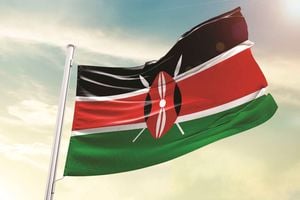
From left: Vivian Kajaya, Eileen Cherotich, Seth Nyakio and Rita Waeni.
To eradicate femicide, a special police unit will woefully fall short. For two months in a row now, the subject of femicide has dominated news headlines as the number of women and girls murdered under controversial circumstances continues to grow.
Different leaders at all levels have expressed their anger and disgust at the unfortunate turn of events, with none other than the president weighing in on it on various occasions, the latest being last week during the installation of the new Deputy President, Prof Kithure Kindiki.
While femicide has been treated as a standalone national security issue with suggestions by female leaders calling for the establishment of a special police unit responsible for the prevention, monitoring and eradication of violence against women in all its forms, research suggests that there is need to take the route of an interdisciplinary approach bearing in mind that femicide does not occur in isolation, with underlying factors contributing to its prevalence, including but not limited to; discrimination on account of gender, the systematic entrenchment of the culture of violence which favours male perpetrators, institutionalized impunity permeating state bureaucracy at the disadvantage of the vulnerable public, and, poverty – both food and material.
In order to have a chance at winning the war against femicide, a special police unit for the eradication of femicide should be last of the options to be considered, taking into account the limitless amount of human and material resources requires to get such a project off the ground.
A great place to start would be a sustained advocacy program aimed at reforming deeply rooted traditional sociocultural biases towards the female gender. Such a program will be highly embraced by the younger generation, especially considering the latest emergence of the Gen Z phenomenon; a transformative generation of young Kenyans who have shown open bias towards the expression of liberal thought and the abhorrence of traditional bureaucratic norms.
Also Read: Ending femicide crisis
The younger generation, who have been raised up in a freer environment dissimilar to that of their parents, would be the perfect champions of change of mindset, shaping the way they perceive of and think about gender roles, respect to the sanctity of life, and promotion of the broad spectrum of human rights as espoused in progressive laws aimed at the protection of marginalised groups and other minority groups in society.
Having started the conversation about shifting mindset towards non-discrimination on the basis of gender, the next step would be to focus on a sustained advocacy phase geared towards tearing down entrenched gender stereotypes pumped into us by the fossils who operated in a sociocultural planet that is polar opposite to the one we currently eke out a living from.
This policy shift includes a scenario mapping out of all the critical outlets of mass information that influence public opinion of the younger generation, whether in the media, on the street, at school or in places of worship, and letting them know that it is okay to practice a different set of ideals that promotes the equality of the genders.
When young men are ushered into public spaces where discussions about the practice of informed consent is entertained and encouraged, they will be emboldened to respect the concept of bodily autonomy and accountability without being judged or frowned upon by those who consider this discourse too liberal and lacking in manly predisposition.
By encouraging young men to treat women as deserving of basic rights to bodily autonomy, the society would be eradicating the culture of male control over women’s bodies, what they choose to do with it, and how they choose to express themselves.
It is at this stage of advocacy, too, that young men would be reminded on the values of accountability to actions that undermine the practice of free expression by women.
In societies where men are empowered to change their inborn perception and individual attitudes towards women and girls, to treat them with respect and high dignity devoid of sociocultural biases exposed to them at an earlier age, the practice of femicide is seen to be considerably lower than in societies that still hold on to traditional sociocultural practices that view gender norms in the lenses of male domination.
Killing women should not ideally ignite a gender war, since the state prosecution of perpetrators of murder is not gender-nuanced and viewed equally before the law as a criminal act.
Treating acts of criminality for what they are should be the backbone of equality in the preservation of the sanctity of life, regardless of whether they are that of women or men.
To effectively combat femicide and other acts of gender-based violence, there is a need to first understand the sociocultural underpinnings of the policy issue under focus, and not to treat it as a standalone parameter devoid of the entrenched knowledge, prevailing attitudes, retrogressive traditions and other gender norms that encourage the thriving of it.
As such, coming up with a relevant data-driven programme to deeply understand the origins and sustainable prevention measures to curtail the spread and proliferation of the practice of femicide should be of utmost priority for those working in the gender policy space.
There will not be enough police to focus on femicide cases alone, and setting up the special police unit to investigate, apprehend and charge perpetrators in court will alter the balance towards discrimination of other cases.
We could as well have special police units for the protection of children, religious and other ethnic minority ethnic groups, gender and other marginalized groups who require special protection under local, regional and international legal jurisdictions.
The only guaranteed policy intervention towards mitigating the proliferation of femicide is by coming up with a sustainable national implementation plan aimed at shifting the mindset of the younger generation and altering the traditional power structures that have enhanced its spread.









